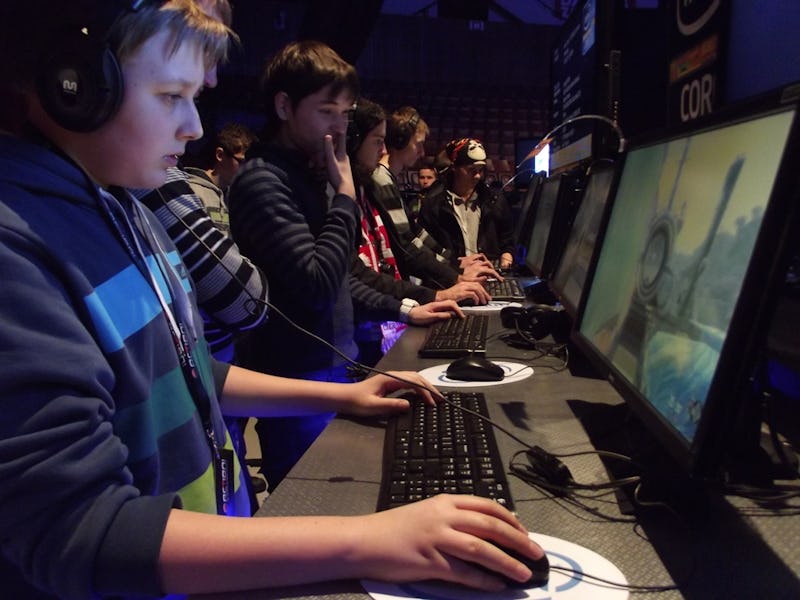'Fortnite' Addiction Isn't the Problem. It's the Symptom.
We need psychologists who actually play video games.

Child psychologists are concerned that Fortnite is contributing to declining grades and video game addiction, but I’m not convinced. In a recent segment on Cheddar, Live Science editor Sara Miller offered a bit more context on what appears to some to be a growing issue, but the report still leaves a lot to be desired.
Miller’s explanation for Fortnite’s meteoric success checks out. It’s the top dog in an already lucrative Battle Royale space thanks to a number of smart design decisions. The game is cartoony and inviting (even if there’s a steep learning curve), drawing in a much wider audience than other titles in the genre. It’s also available on almost every platform imaginable, including smartphones. Most importantly, it’s free. Fortnite developer Epic Games has addressed virtually every possible barrier of entry, and the company recently that it now has a whopping 125 million players.
That’s an unprecedented number, but the anti-gaming argument it’s incited is nothing new. Using popular video games as a scapegoat for anti-social behavior and low work ethic has a long history.
Video games have always been suburbia’s boogeyman
Jack Thompson, an anti-gaming activist who hated rap and video games, so he REALLY hated Grand Theft Auto
In the 1990s, video games were blamed for an imminent ultraviolent future that never came, and invoked in the wake of the Columbine shooting. More recently, President Donald Trump dredged up that same tired old argument, suggesting that the string of mass shootings in the past year was exacerbated by violent video games.
Aside from the President, you’re less likely to find Americans today who would cite video games as a factor in violent crime. However, many people still view video games as a pastime that halts emotional growth.
Why are video games always singled out among other hobbies?
Listen, it's a ridiculous game with dancing astronauts and flying shopping carts, but its can be pretty complex.
Live Science’s own article on this subject quotes child psychologists, who appear to make their diagnoses based on a shallow understanding of Fortnite and a dismissive view of video games in general.
Psychologist Leonard Sax told Live Science that he recommends no more than 40 minutes of Fortnite a day for children during a school week and about an hour per day on weekends. I wonder how he came upon this number. Would he also be against a child watching two hours of Netflix a day? Three hours of reading a novel?
Sax goes on to say that skills acquired in Fortnite can’t transfer over at all into the real world without explicit parental instruction, and that the collaboration involved to win a game doesn’t constitute true communication.
“Killing people is not a fundamental social skill,” he told Live Science.
Parents (and politicians and psychologists) just don’t understand
Sax is wrong on both counts. He assumes that all that’s required to win a Fortnite game is sharp aim and quick reflexes, but that’s only true if you’re playing with novices. This is the same mindset that would dismiss professional basketball as a purely physical sport devoid of any intelligent decision making or strategy.
Seasoned gamers know that they must outmaneuver and outsmart their opponents to win. What is my enemy going to do next? Are they running for the health pack that I know spawns inside the fourth house on this block? What can I do to bait them out? At a certain point in competitive play, everyone generally has the same reflexes and aim. The players who rise to the top aren’t the quickest or most accurate, they’re the smartest. There’s an old esports adage: Knowing is better than reacting.
Moreover, “killing” is not the point of the game. Victory is, and working together to achieve victory is a fundamental social skill. Any competitive person can tell you that. It’s a communication that often goes beyond verbal cues since things can happen so quickly. Over time, teammates who play together constantly build up a physical repertoire where they can coordinate and execute plays without a single spoken word.
Belgium was the first company to ban lootboxes in Counter-Strike, proclaiming it as a form of underage gambling. The United States has yet to acknowledge it as a problem.
Games can sometimes be a problem, but more often they’re a symptom
Some child psychologists have voiced concerns that modern day children don’t go out enough compared to previous generations. Technology is usually to blame, whether it’s video games today or radio and TV in the past.
Maybe it’s because parents don’t take their children outside as much as previous generations, as Live Science itself reports, and perhaps that’s because Americans work more than any other people in the industrialized world.
I can point to dozens of politicians who blame video games for violence and dwindling physical fitness. But how many of them have blamed poor workers’ rights and oppressive corporate work culture for inadequate parenting and declining health?
There are lots of serious problems with video games. Distributors selling games made by white supremacists to spread their warped values is a big one. Rampant underage gambling is another.
But in both of those cases, video games aren’t the problem. The problem is legislators who don’t give a damn about corporations that profit off Neo Nazis or exploit impressionable children, but suddenly grow deeply concerned about video games when it becomes a convenient excuse to explain away their bad parenting and other societal problems.
Respectfully, the kids playing these video games are probably fine. It’s the politicians and psychologists who need to grow up and have the courage to point out the actual big problems that are producing anxiety and depression in our society, rather than point a finger at video games once again.